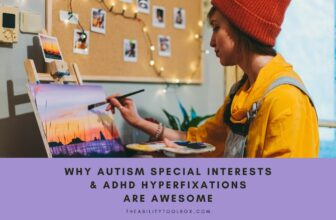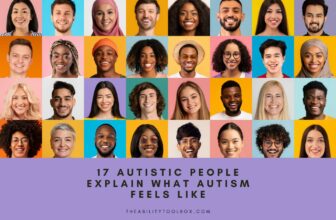Many people have a basic understanding of what it's like to be a mom. They can imagine the joys and challenges, how it feels to hold your new baby, how difficult it is to get them to sleep through the night, and the patience needed.
However, many moms have unique experiences that are often overlooked or misunderstood. One example is autistic moms who face additional challenges that make motherhood even harder than usual. It is estimated that 2.21% of adults have ASD in the US. This blog post aims to provide an overview of what autistic mothers experience so that others can better understand their needs and meet them where they are.
The Empathy Gap in Autism
If you're an autistic woman, being perceived as cold and emotionless is probably familiar. This stereotype has been around for a long time.
However, research has shown that this stereotype isn't completely accurate. Many autistic people feel empathy but have difficulty expressing it. This phenomenon is called “the empathy gap” in the autistic community. It affects those on the spectrum and their loved ones who struggle with understanding what they have experienced.
Challenges Faced by Autistic Moms
As an autistic woman, you may face some unique challenges that neurotypical mothers don't. For example:
- You are more likely to be single parents than your NT peers. As of 2021, there were 15.62 million families with just a female householder and no spouse. This can make it harder for you to get support from your partner or family network when needed. If you have a partner, he is less likely to help with childcare and household chores than other dads because he doesn't understand what it's like for his child and/or wife.
- You're also more likely to live in poverty because people with disabilities generally earn less than those without disabilities. This means there isn't as much money for food, clothing, and shelter. Data from UN Women shows that at least 19% of women live with a disability such as autism and others.
- Since autism has a clear yet little-understood genetic component, your children may also be autistic or otherwise neurodivergent.
How to Navigate Challenges Faced by Autistic Moms
Autistic mothers face unique challenges that can be overcome with the right support.
Online Postnatal Classes Can Help
Online postnatal classes are a great way to connect with other moms. You can learn from experts and other autistic moms who have been through what you are going through. If you're feeling isolated or disconnected, online classes can help you make connections with people who understand what it's like to be a mother in your situation.
It's essential for autistic women because it helps us feel less alone and because these connections can help us get the support we need during our pregnancies and after giving birth, a time when we may need extra care due to our heightened sensory sensitivity.
You can learn many things with online postnatal classes, such as newborn baby massage, postnatal yoga, weaning workshops, sleep schedule workshops, etc. All these can help you raise your baby without facing significant life challenges.
As stated by The Honest Midwife, the fun starts with your baby's arrival, and this can bring joy to your life. You can learn to create a safe environment for your baby to sleep, read their signs, and do so.
Become a Part of a Community
A lot of people don't realize the importance of social support. When faced with challenges, it's easy to feel isolated and alone. But we can't do this alone. We need each other to achieve our goals; support groups and communities are essential.
In fact, many autistic moms find themselves drawn toward online communities because they provide an outlet for connecting with others who share their experiences. Understanding what other parents are going through makes them feel less alone too.
If you don't have access to a local community or an online support group, you can create your own and reach out to other autistic moms.
Navigating Social Communication Difficulties
Social communication difficulties are a common feature of autism. Because social interaction is so important to people, it can be difficult for autistic people to communicate with others and understand what other people are saying. 44% of autistic moms have problems communicating with child professionals like teachers and pediatricians.
The best way to help someone who struggles with social communication is by being patient and supportive when they try their best to communicate with you. If an autistic person has trouble making eye contact or understanding your words, try speaking slowly and clearly.
This will help them understand what you mean. If this doesn't work, try pointing out objects around the room instead of using words. Often, pointing can work better than explaining something verbally because it's easier for autistic folks to understand visual information than verbal explanations that may not immediately make sense.
Improving Mental Health
There are many ways to improve the mental health of autistic moms.
- Social support is one of the most critical factors in improving mental health. You can get it from your family, friends, and colleagues, but if you need help beyond what they can provide, there are many ways to find additional support.
- Talk to your doctor about how you're feeling. They may be able to recommend a therapist or psychiatrist who specializes in treating people with autism spectrum disorders (ASD).
- If you don't feel comfortable talking with someone face-to-face, plenty of online resources are available where users share their experiences and offer advice on getting through tough times.
- Consider joining an online support group where other moms diagnosed with ASD can share tips on parenting techniques that work best for them because every parent has different needs.
The Autistic Mother's Experience
As an autistic mother, you will likely have a unique experience different from other mothers. Here are some things to keep in mind:
- Others may misunderstand you. Many people don't understand what being on the autism spectrum means or how it can affect how you communicate with others and interact with your child. It can be challenging for them to understand why you might act differently than they would expect a parent to act. This may lead them to think that something is wrong with you or your family, making it difficult for them to accept and love you and your children as they are.
- You may feel isolated from other moms who don't understand what it means to live life as an autistic person or even just as someone with mental health issues like anxiety or depression. You might find yourself desperately wanting to connect with someone like yourself but are unable to do so.
Conclusion
An autistic mother's experience is a complex one, and it can be challenging to understand. But with the right support and resources, you can navigate your journey as an autistic mom with confidence in yourself and your abilities.
Hey I'm Olivia and I'm a proud Autistic woman. My special interests are cats, stim toys, and electronic music! I love to write and help other Autistic adults find ways to enjoy life in this LOUD world!








